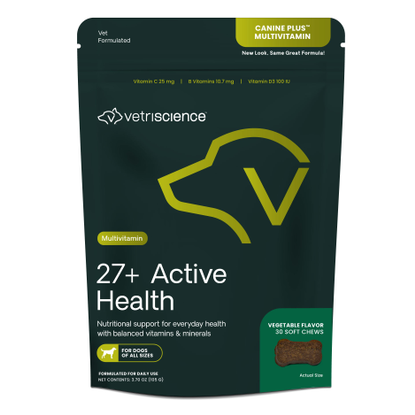Vitamins and Minerals Required in Dog Nutrition

All featured products are chosen at the discretion of the GreatPetCare editorial team and do not reflect a direct endorsement by the author or reviewer.
Vitamins and minerals are significant components of dog nutrition helping them fight disease and maintain good health. In this article, we’ll discuss the importance and requirement of vitamins and minerals in dog food and take a closer look at many of the vitamins and minerals your dog needs and how these nutrients benefit your dog’s health.
What Vitamins Do Dogs Need?

Vitamins are organic compounds that your dog needs to sustain life, grow, and be healthy. Most vitamins and minerals are found naturally in food. You are probably already familiar with most essential vitamins needed for the human body. Dogs need basically the same vitamins as humans, but the levels they need are different than humans. If dogs are given inappropriate amounts of vitamins or minerals, it can cause deficiencies or toxicities that result in serious health problems. This is why it is important to use a recipe created by a board certified veterinary nutritionist if you cook for your dog.
Important Vitamins for Dogs
The following is a list of vitamins that dogs need:
Vitamin D helps dogs maintain phosphorus and calcium balance for healthy bone and muscle growth. It is also important for the immune system and growth in puppies.
Vitamin E supports the growth of puppies and is a valuable antioxidant in senior pets. It is a fat-soluble vitamin that benefits cell function, metabolism, and defense against oxidative damage. Deficiency will lead to muscle degeneration and reproductive problems.
Vitamin K is a fat-soluble vitamin and helps prevent bleeding problems and improves blood clotting.
Vitamin A is a fat soluble vitamin that is required for growth, a healthy immune system, cell function, and eye health.
Choline is a key nutrient for dogs and aids in important liver and brain function.
B Vitamins regulate metabolism, are important for health of the nervous system, proper function of red blood cells, gene activation, hormone regulation, and a healthy immune system. While B vitamins offer benefits for all pets, they are noted to alleviate fatigue and improve appetite in some older pets.
Vitamin C is an antioxidant that reduces inflammation, improves cognitive aging, and healthy immune function, making it especially valuable in senior pets.
What Minerals Do Dogs Need?

Minerals are inorganic substances that are used by the body to build teeth and bones, carry oxygen in red body cells, maintain a proper pH, regulate enzymes, contract muscles, conduct nerve impulses, and more. Minerals are divided into two groups: major minerals and trace minerals. Major minerals are required in large quantities, and include phosphorus, calcium, sodium, magnesium, potassium, chloride, and sulfur. Trace minerals are required by the body in small amounts, and include copper, zinc, iodine, chromium, manganese, selenium, and fluorine.
Important Minerals for Dogs
The following is a list of most major and trace minerals required by your dog to be healthy:
Potassium, sodium, and chloride are the three main electrolytes present in the dog’s body. Electrolytes are minerals and are present in the body as electrically charged ions and particles. Thus, these electrolytes play a crucial role in maintaining your dog’s fluid balance, transmitting nerve impulses, muscle contractions, and body pH balance.
Magnesium is the main component of enzymes, bones, and intracellular fluids. Additionally, magnesium has a large effect on neuromuscular transmission.
Zinc assists in activating hormones, enzymes, and various other bodily functions. Recent research has shown that more than 200 enzymes require zinc for activation and production. Zinc also aids growth, wound healing, reproduction, strengthening the immune system, skincare, protein digestion, and thyroid function regulation.
Copper helps provide the synthesis of chemical transmitters used by the nervous systems, bones and connective tissues, and the formation of collagen. Additionally, it provides antioxidant defense, pigmentation of the skin and hair, and aids growth of red blood cells.
Selenium is a trace mineral and has many health benefits. The primary function that selenium performs is the metabolism of thyroid hormones and antioxidant protection.
Iron is one of the most necessary minerals for the dog’s body. It plays many roles, but its most crucial function is transporting oxygen throughout the body.
Calcium and phosphorus are two minerals that are the building blocks of bones and teeth. Calcium is also important in nerve impulse transmission, muscle contractions, controlling blood pressure, blood clotting, and hormone and enzyme secretion.
How to Choose Vitamin and Mineral Supplements for Dogs
Before adding supplements to your dog’s food, it is best to always check with your veterinarian. Remember that most dogs can get all the vitamins and minerals they need from their dog food, but some dogs can benefit from a multivitamin supplement. For example, senior dogs may benefit from a glucosamine and chondroitin supplement, which can help improve joint health. Fatty acid supplements can also help alleviate joint inflammation in senior dogs. When in doubt about what to give your dog, check with your vet.
Nutritional Products for Dogs
We’ve curated a list of our favorite vitamins and nutritional products for dogs. Happy shopping!
VetriScience Canine Plus Multivitamin Soft Chews

If you’re concerned that your dog isn’t getting all the vitamins and minerals they need to thrive from their diet, this comprehensive multivitamin from VetriScience is formulated to fill any nutritional gaps. It contains vet-recommended vitamins, minerals, essential fatty acids, amino acids, and antioxidants to promote overall health and well-being. Plus, your dog will get balanced stress B complex to help boost mood, memory, and cellular metabolism, along with Omega fish oils to help combat inflammation.
Highlights
- Daily multivitamin formulated to help support heart, brain, and immune health
- Made with 25+ premium nutrients not found in ordinary dog foods
- Vet-recommended, especially for dogs on homemade or raw diets
- Feed according to manufacturer’s directions: Half a chew daily for dogs under 30 lbs, one chew daily for dogs 30-60 lbs, two daily chews for dogs over 60 lbs
Things to Consider
- Suitable for dogs of all sizes and ages, though the manufacturer suggests checking with your veterinarian, as supplements may not be appropriate for some large breed puppies under the age of one.
Nordic Naturals Fish Oil Supplement for Dogs

If your dog could have a sharp mind and healthy skin and coat thanks to one product, Nordic Naturals Omega-3 Fish Oil supplement is worth considering. It contains fatty acids along with EPA and DHA to support your dog’s eyes, heart, and brain whole keeping her joints healthy and skin beautiful. All Nordic Natural omega-3’s are of the triglyceride molecular form that is naturally found in fish.
Highlights
- Derived exclusively from wild anchovies and sardines
- May be served directly on your dog’s food or served by itself
- Friend of the Sea certified & sustainably made in a zero-waste facility powered by biofuel
- Crafted from fresh, wild-caught, omega-rich fish
- Non-GMO verified and third-party tested for purity
- May reduce shedding and improve coat
Things to Consider
- Does not come with a pump, so the oil must be measured for each dose
- Also available in capsule formula
- Do not use Nordic Naturals human products on pets









